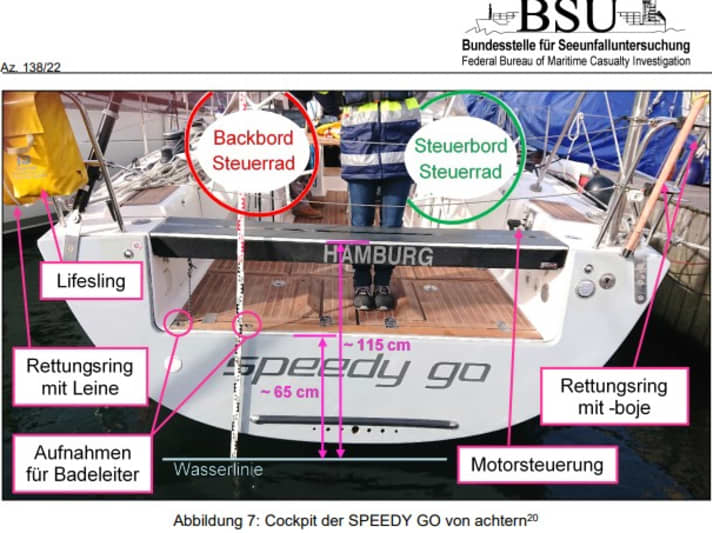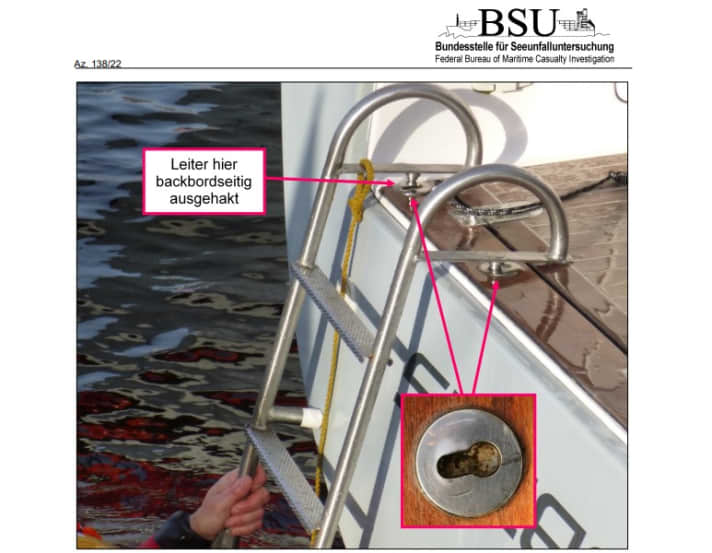
The Report is a frightening illustration of how difficult it is to get a fellow sailor who has fallen overboard back on board. And this despite the fact that in this case the person had managed to get to the stern of the yacht. Even a crew member who had climbed into the water with the casualty was ultimately unable to help rescue him.
The tragic accident occurred on a training yacht belonging to a renowned sailing training, cruise and transfer provider, which had set off on a heavy-weather training cruise in April 2022. Just over an hour after casting off from Flensburg harbour, the skipper fell overboard at the height of the foredeck as a result of an unsuccessful jibing manoeuvre.
One wrong move at the wrong time and it happens
He had stayed there to clear the jib sheets, which had become jammed under a fitting during the manoeuvre. When he had managed to do this together with a fellow sailor, he apparently righted himself just at the moment when pressure came back into the foresail and the ship lay on its side. The skipper fell over the railing into the water.
He was neither on a lead nor, unlike the rest of the crew, was he wearing a lifejacket. He had obviously taken it off when he had previously gone below deck. He had specifically instructed the crew to put on the waistcoats when they set sail and had done so himself.
At the time of the accident, the wind was blowing at 5 to 6 Beaufort from a west to north-westerly direction, with gusts of 7 to 8 Beaufort. The ship was sailing at a speed of around 7 knots. The water temperature was around five degrees Celsius.

According to the BSU report, the crew immediately initiated rescue measures: The engine was started, the foresail was hauled in and a rescue collar on a floating line was thrown to the casualty. He was able to grab the collar and the line and was pulled to the stern of the yacht by the sailors.
What use are swim ladders that are not permanently installed at the stern in an emergency?
On the skipper's instructions, the bathing ladder was mounted. However, he was unable to climb the steps under his own steam. The BSU report leaves unanswered whether he was exhausted or had injured himself when he fell overboard.
The crew then made an emergency call and shot red. A fellow sailor also climbed into the water to help the skipper climb the swim ladder. However, as his lifejacket inflated, his freedom of movement was severely restricted. In addition, the construction of the ladder, which was only loosely attached and not permanently mounted, proved to be extremely wobbly. It had to be permanently held in place by a fellow sailor.

In the course of trying to pull the skipper up the ladder with the help of a line, the line came loose from its mount and went overboard. The skipper and the co-sailor who had climbed into the water immediately drifted away from the ship and apart.
The crew managed to reach the crewmate quickly and he was able to climb on board with the help of a line. He escaped with hypothermia. The skipper was spotted shortly afterwards by a rescue helicopter and rescued from the water. However, immediate resuscitation measures were unsuccessful and he did not survive the accident.
Why was it not possible to get the skipper back on board? Just one of many questions that still need to be answered
In the coming weeks, the BSU will conduct a final investigation into what exactly caused the vessel to go overboard and how it could have been prevented, as well as why the crew was unable to get their skipper back on board via the stern, and will then publish a final report. In this report, the experts will certainly also look in detail at the question of whether a loosely attached bathing ladder is suitable for an exhausted person to climb aboard. Or whether other rescue systems would be preferable in such or similar cases.
What the report undoubtedly already makes clear is that every crew should always think about their safety and take appropriate measures. In particular, you should always critically check whether it is advisable to put on a lifejacket and lifebelt and to tick yourself in with the lifeline when leaving the cockpit.
It is also advisable to regularly practise man-overboard manoeuvres and, in particular, to practise rescuing an unconscious co-sailor from the water.

